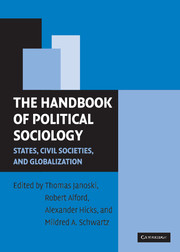Book contents
- Frontmatter
- Contents
- Preface
- Contributors
- Political Sociology in the New Millenium
- PART I THEORIES OF POLITICAL SOCIOLOGY
- PART II CIVIL SOCIETY: THE ROOTS AND PROCESSES OF POLITICAL ACTION
- 10 Money, Participation, and Votes
- 11 Public Opinion, Political Attitudes, and Ideology
- 12 Nationalism in Comparative Perspective
- 13 Political Parties
- 14 Organized Interest Groups and Policy Networks
- 15 Corporate Control, Interfirm Relations, and Corporate Power
- 16 Social Movements and Social Change
- 17 Toward a Political Sociology of the News Media
- PART III THE STATE AND ITS MANIFESTATIONS
- PART IV STATE POLICY AND INNOVATIONS
- PART V GLOBALIZATION AND POLITICAL SOCIOLOGY
- References
- Name Index
- Subject Index
12 - Nationalism in Comparative Perspective
Published online by Cambridge University Press: 05 June 2012
- Frontmatter
- Contents
- Preface
- Contributors
- Political Sociology in the New Millenium
- PART I THEORIES OF POLITICAL SOCIOLOGY
- PART II CIVIL SOCIETY: THE ROOTS AND PROCESSES OF POLITICAL ACTION
- 10 Money, Participation, and Votes
- 11 Public Opinion, Political Attitudes, and Ideology
- 12 Nationalism in Comparative Perspective
- 13 Political Parties
- 14 Organized Interest Groups and Policy Networks
- 15 Corporate Control, Interfirm Relations, and Corporate Power
- 16 Social Movements and Social Change
- 17 Toward a Political Sociology of the News Media
- PART III THE STATE AND ITS MANIFESTATIONS
- PART IV STATE POLICY AND INNOVATIONS
- PART V GLOBALIZATION AND POLITICAL SOCIOLOGY
- References
- Name Index
- Subject Index
Summary
THE STATE OF THE FIELD
The inclusion of a chapter on nationalism in a Handbook of Political Sociology, which introduces subjects fundamental to the profession in these early years of the twenty-first century, reflects the recognition, which has grown steadily in the past twenty-five years, of the political importance of nationalism. There has been considerable academic interest in nationalism before, but this interest wavered and at times seemed to disappear altogether. This faltering interest may be held responsible for the fact that our understanding of the phenomenon did not advance as much as one could have wished from the beginning of World War II, when its violent eruption took American social scientists by surprise, and even from the beginning of the twentieth century.
The work of Hans Kohn is among the most useful early efforts in attempting to come to terms with the development of nationalism in historical perspective. Kohn was particularly notable for constantly stressing that nationalism is fundamentally an idea, rather than a static, structural phenomenon, echoing the argument that the French sociologist Ernest Renan made three-quarters of a century earlier. However, Kohn (as well as Renan) can be criticized for being insufficiently rigorous in defining the idea of the nation. For him, the nation was fundamentally a sovereign community, but he failed to recognize the essentially secular quality of nationalism or the structural implications of national consciousness.
- Type
- Chapter
- Information
- The Handbook of Political SociologyStates, Civil Societies, and Globalization, pp. 247 - 265Publisher: Cambridge University PressPrint publication year: 2003
- 1
- Cited by



